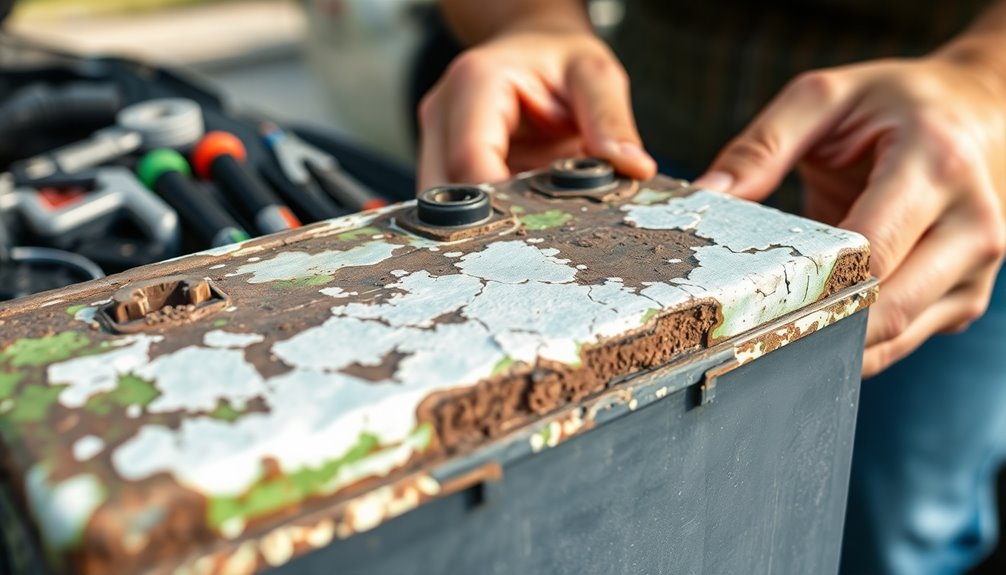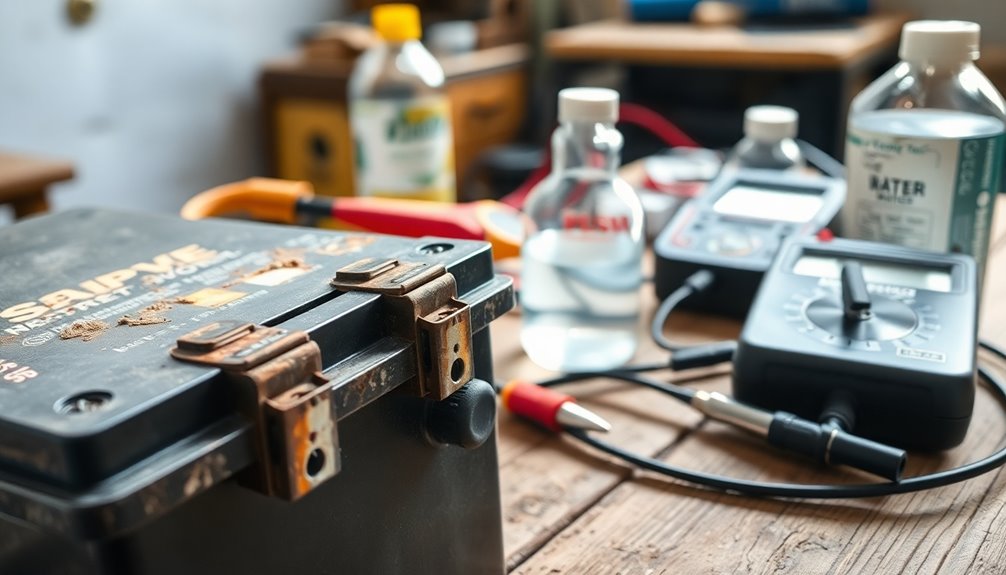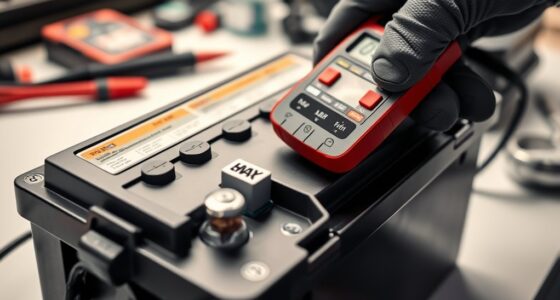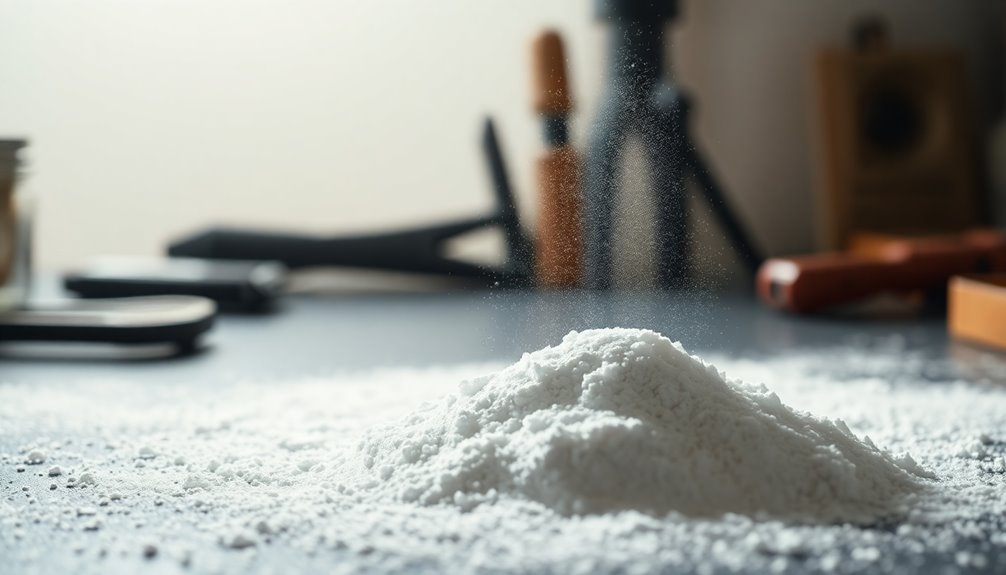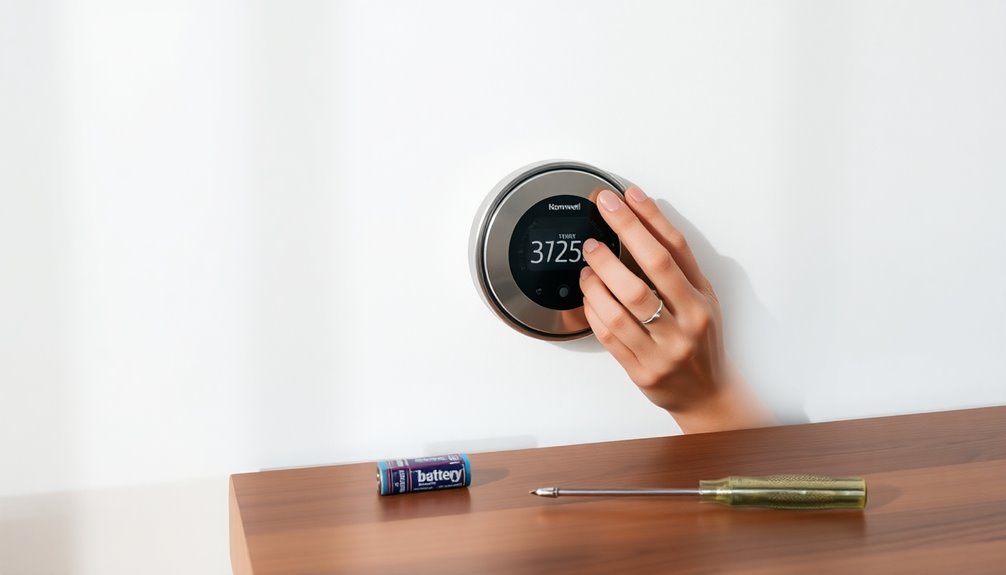Yes, corroded batteries often need replacement. Corrosion can cause serious performance issues, making your vehicle hard to start and risking total power loss. If you notice a white or greenish powdery substance around the terminals, it's a sign of corrosion. Ignoring this can lead to leaks or even explosions, posing safety risks. If your battery shows cracks or significant corrosion, it's time for a new one. Regular inspections can help you catch these issues early. Keep an eye on your battery's health, and you might just avoid costly replacements. There's plenty more to explore regarding battery maintenance and safety!
Key Takeaways
- Corroded batteries with visible damage, like cracks or leaks, should be replaced immediately to prevent safety hazards and ensure reliable performance.
- Corrosion can increase electrical resistance, leading to poor battery performance and potential failure if not addressed promptly.
- Regular inspections for corrosion signs can help determine if a battery needs replacement before it causes starting issues or power loss.
- Ignoring corrosion may lead to costly repairs or replacements of electrical systems, emphasizing the importance of timely battery maintenance.
- Professional installation of a new battery is recommended to ensure it meets vehicle specifications and to avoid installation-related damage.
Causes of Battery Corrosion
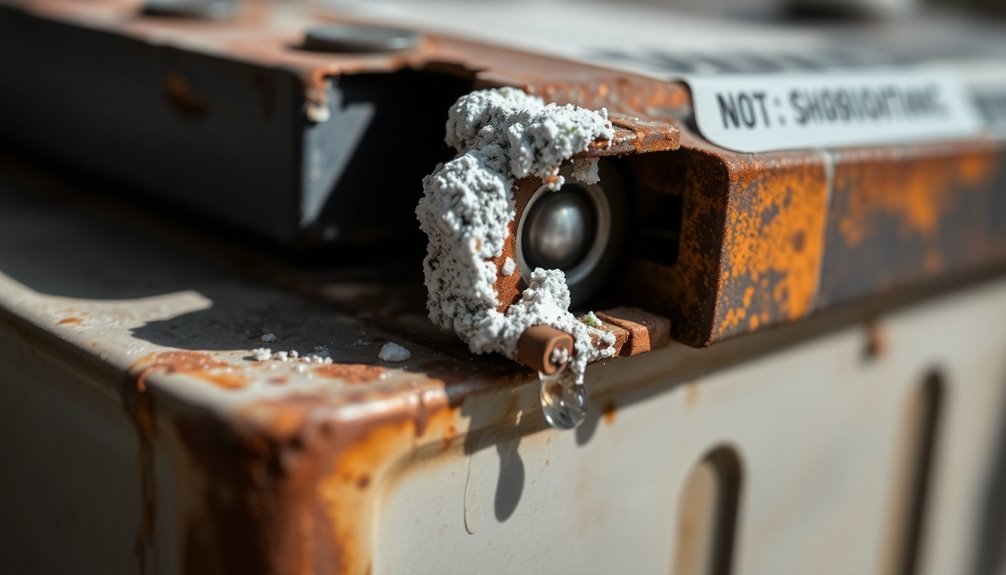
Battery corrosion can stem from several common issues that affect its performance and lifespan. One major factor is overcharging. When you overcharge a battery, it can lead to increased temperatures and gas buildup, causing the electrolyte to expand and sulfuric acid to boil in flooded lead-acid batteries. This overheating accelerates corrosion, so it's crucial to monitor your charging process closely. Additionally, poor electrical connections can lead to increased heat, further contributing to the corrosion of battery terminals.
Another issue arises from overfilling the battery with water. Excess water can dilute the electrolyte, raising the risk of leakage and damaging the battery casing. This not only reduces the battery's lifespan and capacity but also leads to chemical reactions that can cause corrosion on the terminals.
Leaking or damaged batteries are also significant contributors to corrosion. If the battery's integrity is compromised due to age or physical damage, the electrolyte can come into contact with metal terminals, leading to buildup and corrosion.
Lastly, environmental and chemical factors play a role. Reactions between battery acid and metal terminals can be accelerated by hydrogen gas, moisture, and high temperatures.
Symptoms of Corroded Batteries
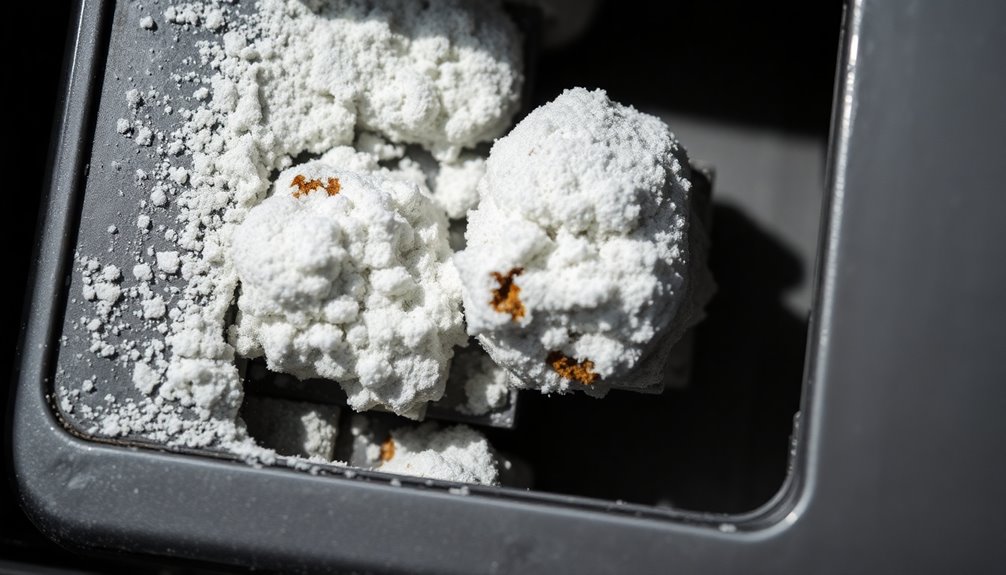
How can you tell if your battery is corroded? First, look for visual indicators. If you notice a white, blue, or greenish powdery substance around the battery terminals, that's a sign of corrosion. This flaky, crusty grime can have a granular texture, often appearing on the battery posts, terminals, or cables.
Next, pay attention to your vehicle's electrical performance. If you experience slow cranking during start-up, dim headlights, or hear a clicking sound when you turn the key, these may indicate reduced battery power due to corrosion. Difficulty starting your car could also signal a problem. Additionally, ignoring corrosion can prevent proper conductivity, ultimately harming your battery and vehicle.
You should also be aware of any unusual smells or leaks. A rotten-egg odor suggests hydrogen sulfide gas from leaking battery acid, which is a clear warning sign. Check for any signs of sulfuric acid leaks or condensation on the battery's surface.
Lastly, inspect the battery condition itself. A warped, swollen, or cracked casing can indicate internal damage, especially if your battery is over five years old. If you see these symptoms, it's time to evaluate whether you need a replacement.
Dangers of Ignoring Corrosion
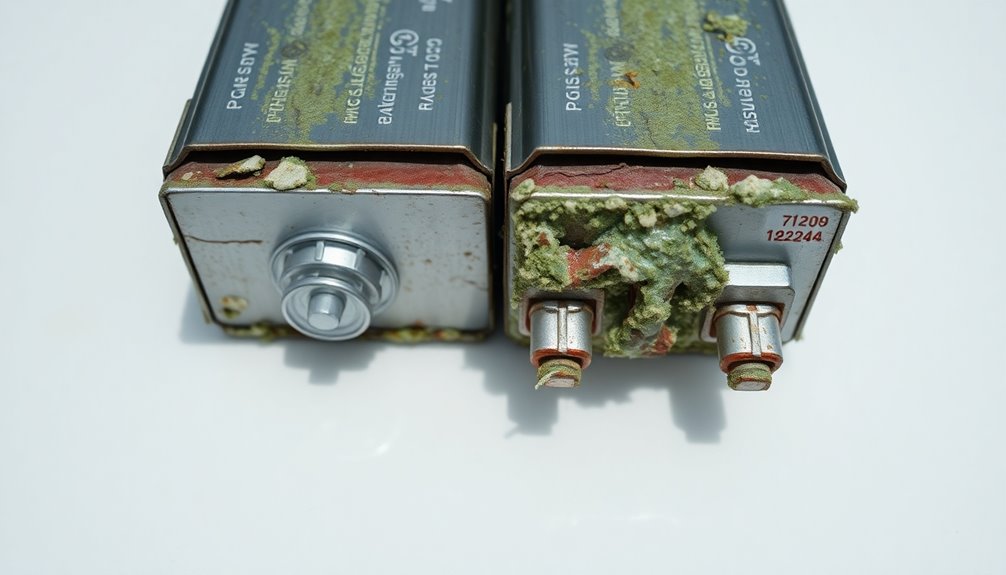
Ignoring corrosion on your battery can lead to serious consequences that affect both your vehicle's performance and your safety. When corrosion builds up, it interferes with the electrical current, increasing resistance within the circuit. This can reduce your battery's life, disrupt electrical systems, and even prevent your vehicle from starting. You might find yourself needing frequent jump starts as power loss becomes a persistent issue.
Moreover, corrosion can damage your battery's internal components, leading to complete failure long before its expected lifespan. This not only affects the on-board computer but can also cause malfunctions in essential accessories like power windows and locks. You may notice dimming headlights or flickering interior lights, clear signs of disrupted electrical flow. Regular inspection can help identify corrosion early, allowing you to address the problem before it escalates.
Ignoring these issues poses a safety risk, too. A leaking battery can damage nearby components, and overcharging or undercharging can create further electrical problems. In the worst case, corrosion can lead to a total loss of power, potentially stranding you in dangerous situations.
The financial implications are significant, with heavy corrosion resulting in costly battery replacements and expensive repairs to damaged electrical systems. Regular maintenance is crucial to avoid these dangers.
Cleaning Corroded Battery Terminals
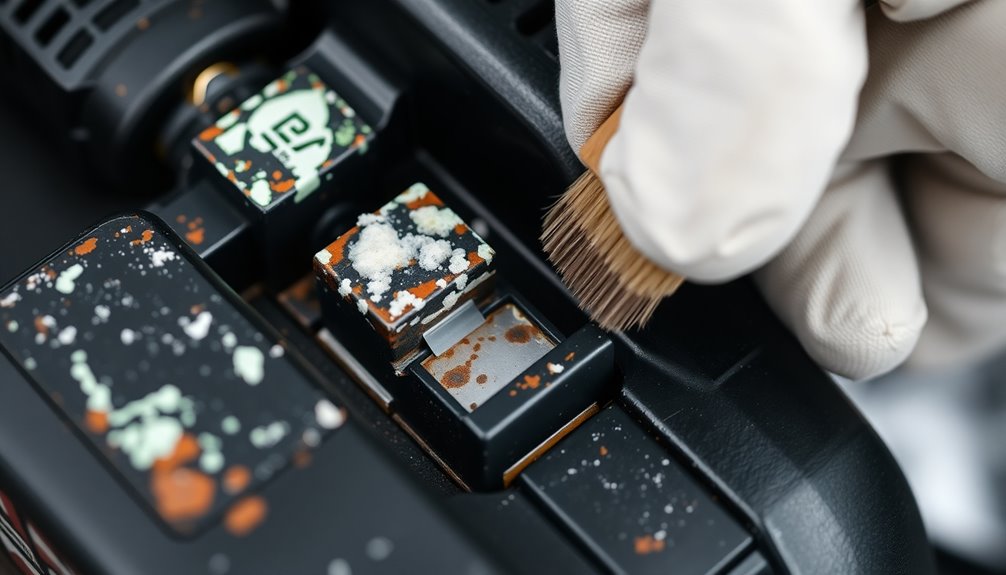
Corroded battery terminals can create significant problems for your vehicle, but cleaning them properly can restore functionality and prevent further issues.
Before you start, make sure to wear gloves and safety goggles to protect yourself from battery acid. Always inspect the area around the battery for signs of leaking acid, and ensure the engine is off and cooled down. If needed, use a battery memory saver to protect your car's electrical system. Note that humidity can accelerate corrosion, so it's important to keep the area around the battery dry.
Begin by disconnecting the negative terminal first, followed by the positive terminal. If possible, remove the battery for safer cleaning. Inspect the battery cables for fraying or corrosion and replace them if necessary.
To clean the corrosion, mix one tablespoon of baking soda with one cup of water to create a neutralizing solution. Use a wire brush or stiff-bristled toothbrush to scrub the terminals, applying the solution carefully to avoid the battery cells.
After rinsing the battery posts with clean water, dry them completely with a clean rag. To prevent future corrosion, apply felt battery washers and silicone-based terminal grease before securely reconnecting the terminals, starting with the positive one.
Maintenance Tips for Battery Health
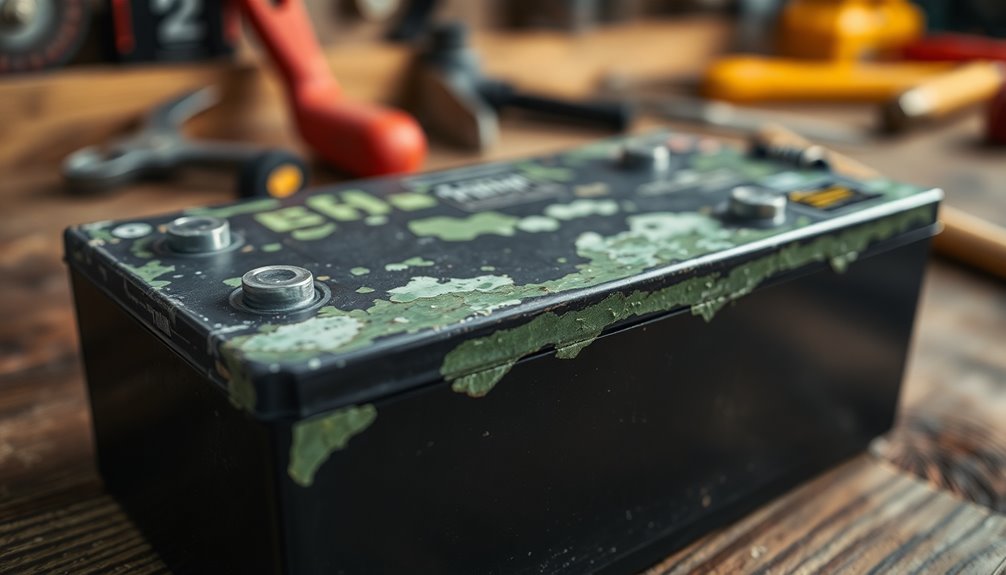
Maintaining battery health is crucial for ensuring your devices run smoothly and last longer. Start by avoiding extreme temperatures; keep your devices out of direct sunlight and hot environments to prevent overheating. Likewise, don't leave devices in cold areas, as this can diminish performance. Aim to store them in a temperature range of 20°C to 25°C. Moderate temperatures optimize performance and help prevent damage to your battery.
Next, manage your charging habits effectively. Avoid letting your battery drop to 0% or charge to 100% continuously. Instead, maintain levels between 20% and 80% for optimal health. Disconnect devices once they hit 100% to prevent stress and overheating, and consider using smart plugs to avoid overnight charging.
You can also optimize your device settings. Enable Low Power Mode to reduce consumption and lower screen brightness when possible. Turn off Background App Refresh for non-essential apps and limit location services when not needed.
Lastly, give your devices breaks from intensive tasks to cool down and remove cases while charging for better heat dissipation. Regularly update your software and monitor background processes to enhance efficiency and prolong battery life.
When to Replace Your Battery
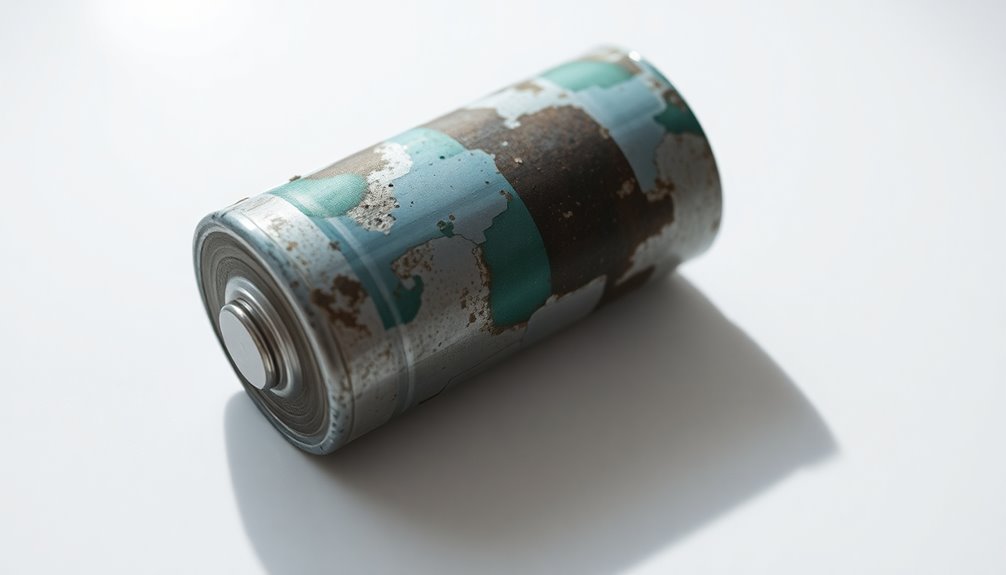
Understanding when to replace your battery is just as important as knowing how to keep it healthy. Generally, you should expect your battery to last between three to five years. If it's over five to seven years old, it's likely nearing the end of its useful life. Even without visible corrosion, age can impact performance, so regular checks are essential.
If you notice corrosion, act quickly. Extensive corrosion can severely affect your battery's performance, leading to issues like slow cranking or dim lights. If cleaning doesn't help and corrosion keeps coming back, it's time to consider replacement. Battery corrosion often acts as a barrier, preventing the battery from charging effectively.
Keep an eye out for leaks or physical damage, too. A cracked battery or one that's leaking can cause corrosion and safety hazards. If you detect leaks from vents or see significant damage, replacing the battery is crucial.
Lastly, watch for performance issues. Slow engine starts, weak lights, or clicking sounds during startup often indicate a failing battery. If your battery voltage is consistently below 12.6 volts, or if you see a bulging case, don't hesitate to replace it for your safety and your vehicle's performance.
Frequently Asked Questions
Can I Use Vinegar Instead of Baking Soda for Cleaning?
Yes, you can use vinegar instead of baking soda for cleaning.
Vinegar's acidic properties help dissolve corrosion effectively, especially when you combine it with baking soda for that fizzing action.
However, it's less effective at neutralizing battery acid.
Always wear gloves and goggles, and ensure your workspace is well-ventilated.
Disconnect battery cables before cleaning, and remember to rinse with hot water afterward for the best results.
How Often Should I Check My Battery for Corrosion?
You should check your battery for corrosion at least once a year.
If you live in a humid or salty climate, inspect it more often.
Look for signs like dimming headlights or difficulty starting your car, which could indicate corrosion.
If your battery's over three years old or if you've dropped it, it's wise to check regularly.
Always clean the terminals to prevent buildup and ensure a healthy battery life.
Does Corrosion Affect Battery Warranty Claims?
Yes, corrosion can affect your battery warranty claims.
If the corrosion results from neglect or improper maintenance, it might void your warranty. Manufacturers often exclude damage caused by user error.
To strengthen your claim, keep maintenance records to show regular inspections and cleaning. If corrosion stems from a manufacturing defect, you may still be covered.
Always check your warranty terms for specific clauses regarding corrosion to avoid surprises during the claims process.
Can Corrosion Spread to Other Car Components?
Yes, corrosion can definitely spread to other car components if you don't address it promptly.
It often starts at battery terminals and can impair electrical systems, affecting everything from headlights to the ignition.
Additionally, corrosion on metal parts can grow larger over time, particularly in hidden areas.
Environmental factors like road salt and humidity accelerate this process, so regular inspections and cleaning are crucial to prevent widespread damage and maintain your vehicle's safety.
Is There a Specific Type of Grease for Battery Terminals?
Yes, there's a specific type of grease for battery terminals, and it's called dielectric grease.
This grease prevents corrosion and moisture from affecting your electrical connections. It forms a protective barrier, keeping dirt and debris away while resisting high temperatures.
You should apply it after cleaning your battery terminals to ensure optimal performance. Regular maintenance with this grease helps prolong the life of your battery and keeps your vehicle running smoothly.
Conclusion
In conclusion, don't ignore corroded batteries—they can lead to bigger problems if left unattended. If you spot corrosion, clean the terminals and check for other symptoms. Regular maintenance can help extend your battery's life, but if it's showing signs of damage or poor performance, it's time for a replacement. Stay proactive about your battery's health, and you'll save yourself from unexpected issues down the road. Take care of your batteries, and they'll take care of you!

